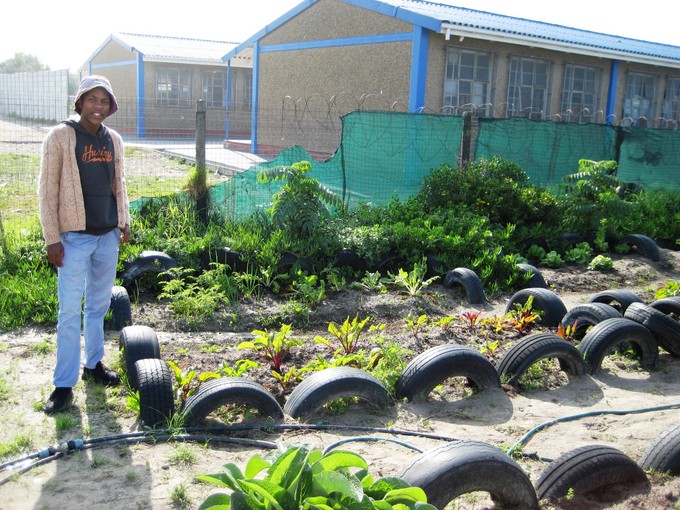
Sizwe Nyuka Mlenzana at his Ekasi Green Project. Photo: Pumla Tuko
14 June 2016
Three childhood friends with a love of gardening inspired by one of their grandmothers are the driving force behind Ekasi Project Green, a small scale farming project run from Vusamanzi Primary School in Khayelitsha.
Sizwe Nyuke Mlenzana (25), Abonga Tom (22) and Lonwabo Mfenguza (21) started the garden in September 2014. They grew up in the same neighborhood and also attended Vusamanzi Primary. They see themselves as “pioneers of organic food” in Khayelitsha.
The small patch of land is bursting with rows of planted spinach, lettuce, beetroot, potatoes, onions, chilis and brinjals. The harvest is distributed equally between the school and the rest of the community for free.
The project hopes to spread small-scale farming in the township so that residents can afford to eat healthily and become self-reliant. It also teaches youngsters healthy eating habits.
“In the beginning, many of the youth around here thought what we did was for old people, but now they see the benefits,” says Sizwe.
The three young men were not trained when they started Ekasi Project Green, but through the help of local workshops, trial and error, and local farming organisations such as Ikhaya Garden and Abalimi Bezekhaya, they soon learned.
Creating such a project is not short on challenges. The sandy soil in Khayelitsha contains few nutrients. Quantities of compost and manure were required to transform this barren piece of land into a fertile garden.
Ekasi has also partnered with Slow Food Youth Network, an organisation from Italy that promotes changing the current food system. Sizwe Mlenzana represented Ekasi in France last year at the third Eating City Summer Campus. Knowledge was also gained through an internship at the Environmental Monitoring Group.
“What I learned is that as young people we need to be involved in this movement because young people are the future … We need to be part of the solution when it comes to climate change, food sovereignty and sustainable ways of living,’’ says Mlenzana.
One of the main goals of Ekasi is to make gardening a fun and cool thing for youngsters. Together with Isikhokelo Primary School, the project runs ‘Living things and non-living things’, a course aimed at teaching kids about cultivation.
Mlezana plans on creating a regular food and music event, where local chefs will be invited to hold cooking sessions using vegetables from the project and where the food will be distributed to the community.
He has been offered overseas scholarships, but for now, he says, “The gardening project needs my full attention … When I’m satisfied with its progress, then I can go study overseas and return to Khayelitsha with the knowledge I’ve acquired.”